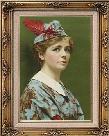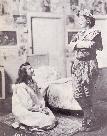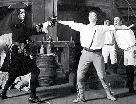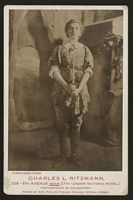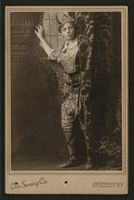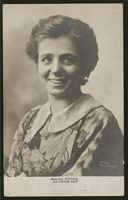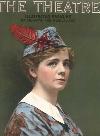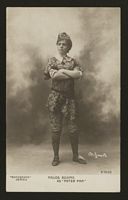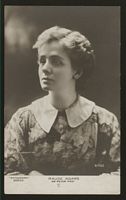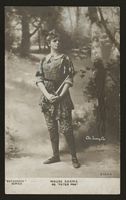
Peter Pan
"Barrie had great misgivings about Peter Pan when he sent his manuscript to America; he frankly told his producer that he did not have much hope for it as a commercial property." Matinee Tomorrow: Fifty Years of Our Theater, Ward Morehouse, 1949
The play first opened Nov. 6th. 1905 at the Empire Theater. She appeared as Peter Pan. The play was performed at various times for a total of more than 1500 performances.
Apparently, at least for a while, the success of the play was in doubt. There was a flyer added to the program which explained the play.
Mark Twain wrote to Maude Adams:
"It is my belief that Peter Pan is a great and refining and uplifting benefaction to this sordid and money-mad age; and that the next best play on the boards is a long way behind it as long as you play Peter."
Louise Boynton had an article that appeared in the December, 1906 issue of The Century Magazine. She said:
"New York needed Peter Pan. The play came at one of those discouraged moments when the public mind was occupied to an almost morbid degree with huge and vexing problems, and with things that were going wrong. Legalized evil-doing was rampant in business and politics, the exposure of fraud was the principal business of those who were not committing it. Cynicism was the dominant note in literature and dramatic art, a cheerful, clever, twentieth-century cynicism, but a bitter and depressing influence, for all that. At such a moment came Peter Pan, created in the mind of a man of insight and gentleness, embodied by a woman beautiful in life and thought, with the soul of an artist, and the heart of a child..."
Playing Peter Pan is not acting a role. It is embodying a living thought. It is expressing the life-force in the simplest, most beautiful way by teaching us to look at life from the child's point of view...Realities that seemed formidable are found not to be real at all, and all sorts of lovely illusions are dreams that may come true."
Some critics did not like the play itself and thought Frohman was wasting Maude Adams' talents. Adults had a much harder time understanding the play than did children.
During the second season on a nation-wide tour; Maude traveled in a railroad car christened "The Tinkerbell".
=====From the Top of the Stairs, Gretchen Finletter, 1946=====
At that time actors and actresses were mysterious and remote and no magazine ever divulged their weight, their love affairs, or how they did their manicures. But the interest in them was just as deep, and we assumed that as they were in their parts, so must they be in their private lives. Half the school worshiped Maude Adams. It was known then as a crush, but the joys of this jelly-like state were much enhanced if they were shared by a dozen others. Pictures of Peter Pan in his little house in the treetops appeared inside schoolbooks to be surreptitiously adored, and thimbles were worn for kisses and Best and Company got out a little cap with feathers. Rows of girls who were older and should have known better excitedly waved very clean pocked handkerchiefs when Peter asked with that particular break in his voice, "Do you believe in Fairies?" and the big ambition was to have been to Peter Pan a greater number of times than anyone else.
I belonged to a smaller and more organized group who loved William Gilette. He was then playing Secret Service, Held by the Enemy and his great role of Sherlock Holmes. The advantage of the Gilette circle, as opposed to the Maude Adams party, lay largely in the fact that William Gilette was a man. Little girls of nine and ten adored Maude Adams. It was silly. To shiver over Sherlock Holmes in his silk dressing gown when he cried, "Quick, Watson, the needle!" bared his arm and stuck the hypodermic in the upper wrist and then gazed out over the audience with that, oh, to tired look-that was a moment of mature experience in one's life. It made the Peter Pan goings on mere childish indeed.
=====Matinee Tomorrow: Fifty Years of Our Theater by Ward Morehouse=====
Henry B. Harris's production of The Lion and the Mouse reached Broadway in November of 1905, the month that yielded two other plays that have stayed in the memory of playgoers of the era. One was James M. Barrie's Peter Pan,, with which Maude Adams captivated a nation; the other was David Belasco's The Girl of the Golden West
Barrie had great misgivings about Peter Pan when he sent his manuscript to America; he frankly told his producers that he did not have much hope for it as a commercial property, but Frohman did not share the Scotsman's doubts. He was elated with the play and talked of little else for weeks. He predicted that Miss Adams would be irresistible in her suit of leaves and that Peter of the treetops and the Never-Never Land would become her most popular role. And during the long run at the Empire, as playgoers from six to sixty came swarming into his theater, he had reason to be pleased with his foresight, but he was a man too free of pretensions and self-importance to go in for self-congratulation, And he was too busy. He was planning to send his star and her Barrie fantasy to every corner of America.
Maude Adams was an actress of good judgment and intelligence and with a sense of obligation to her public. She was always interested in reaching the young people of America. There were the playgoers of the future to be considered, and she insisted upon having a good number of seats selling at 50 cents available at every stand. There came an evening during one of her tours in Peter Pan when the line for the gallery box office in an Eastern city was a block long at 7:40 P.M The regular admission price to the gallery was 50 cents but the house manager, knowing that he could get more for his performance, gave his orders, "Open up, and charge everybody one dollar." When Miss Adams reached the theater a few minutes later there was a teen-age girl sobbing near the stage door. The girl tearfully confided that she had saved up her fifty cents and had been planning for many weeks to see Peter Panbut that she didn't have a dollar and didn't know where to get it. Miss Adams summoned the house manager to her dressing room, told him what she thought of his actions, and demanded that there be a refund of fifty cents to every person who had paid a dollar to get into the gallery that evening. And if he did not do sound there would be no performance. What happened to the young girl who had been crying? She saw the performance in a box seat as the guest of the star.
At the time the Empire first shook with cheers for the daughter of the Kiskaddens in Peter Pan (which was , as John Gasner observed in his Masters of the Drama, perhaps the most escapist play ever written..."
=====The Theatre Handbook and Digest of Plays edited by Bernard Sobel, 1940=====
Peter Pan, the boy who never grows up, flies in the nursery window and takes Wendy and her two brothers with him to exciting adventures in the Never-Never land. He teaches the children how to fly and they have a series of very stirring adventures. They encounter Indians and Capt. Hook and his pirates. Capt. Hook has lost one hand to a crocodile who keeps trailing him in the hopes of completing his meal. Unfortunately he will never catch up to him for he once swallowed an eight-day clock and his tactics are betrayed by the tick-toks. Peter has a fairy friend, Tinker Bell, who saves Peter's life and is in turn saved only when an appeal is made to the audience to believe in fairies. The children get possession of a pirate ship and make the pirates walk the plank. Finally Wendy must return home but she promises to return every spring to do Peter's annual cleaning in this treetop home.
=====J.M. J.M.Barrie and the Theatre by H.M. Walbrook 1922=====
Fantasy as it is, Peter Pan has inspired some rare acting. Miss Nina Boucicault's performance as the hero was a triumph of temperament, insight, and art, and that of Miss Maude Adams* in America was, by all accounts, equally remarkable. *Mr. H. Massac Buist, writing in the Pall Mall Gazette of December 2nd, 1913, said: "I have seen America's first and only peter Pan, Miss Maude Adams. She can convey the notion of impishness and suggest a creature partly human and partly elfish in a manner which no other actress except Miss Boucicault is able to do."
=====J.M. Barrie: The Man Behind the Image by Janet Dunbar, 1970)=====
(Peter Pan was first performed in England with a different actress as Peter Pan)A cable went off to Frohman, who had gone back to America, giving news of the success, and he cabled back his congratulations. When he came to London later, he saw that here was a vehicle for Maude Adams in the States. And he foresaw that the play would make money, a great deal of it, well into the future.
(later...)In America, Peter Pan had opened its run in Washington, going on to Frohman's Empire Theatre in New York. Maude Adams, in a tunic and breeches of her own devising, a hat with a feather in it, and a boyish touch of white at the throat which was to become known to the future as the Peter Pan collar, brought her own special quality to the part. The play was an enormous success. In the American magazine Outlook on November 21, the dramatic critic wrote:
"After the indecencies of a Zaza and Sappho, the scarcely less veiled and more insidious indecencies of the plays presented by Mrs. Patrick Campbell, the horror of Ghosts," the tropical passions of "Monna Vanna," the sinister cynicism of "Man and Superman" and of "Mrs. Warren's Profession," Mr. Barrie's "Peter Pan" now being played at the Empire Theatre, is like a breath of fresh air. It is not to be judged by the ordinary standards of drama, it is a bit of pure fantasy by the writer who, since the death of Robert Louis Stevenson, has most truly kept the heart and mind of a child."
After a seven months' run at the Empire Theatre, Frohman started the play on a series of tours which lasted for most of the year. Maude Adams identified herself completely with her part; she was acclaimed in every city, and the theatres were sold out at most performances. Frohman was, of course, delighted. Money was flowing in a never-ending stream to his and Barrie's coffers. Frohman liked making money as much as he liked spending it freely on ventures which he believed in, but what pleased him most about Peter Pan's success was the fact that his famous little friend was growing even more famous.
=====Letters of J.M. Barrie edited by Viola Meynell, 1947=====
4 December, 1918
P. Pan film I'm not having done at present. Was offered 20,000 (pounds) in Paris the other day, advance sum!
=====Barrie: The Story of a Genius by J.A. Hammerton 1929=====
In the United States all the earlier Barrie successes paled before that of Peter Pan. To Maude Adams the character and the whole strangely various interests of its five crowded acts made as swift an appeal as they had to Frohman. In Peter she say the idealization of everything that was wonderful and wistful in childhood.' Marcosson gives details of her methods of preparing for her interpretation of the immortal boy, which methods he says were characteristic of her attitude to all her work:
"She took the manuscript with her up to the Catskills. she isolated herself for a month; she walked, rode, communed with nature, but all the while she was studying and absorbing the character which was to mean so much to her career. In the great friendly open spaces in which little Peter himself delighted and where he was king she found her inspiration for interpretation of the wondrous boy."
The production was "tried out" at Washington before being brought to New York, and the first night audience there seemed to be somewhat mystified, not quite certain what to think about it. But in New York it caught the fancy of the patrons of the Empire Theatre from the very start and, according to Marcososon, "on this night developed the remarkable and thrilling feature which made the adorable dream child the best beloved of all American children. It came when Peter rushed forward to the footlights in the frantic attempt to save the life of his devoted little Tinker Bell, and asked "Do you believe in fairies?" It registered a whole new and intimate relation between actress and audience, and had the play possessed no other distinctive feature, this alone would have at once lifted it to a success that was all its own."
It would seem that this, perhaps the most meretricious gesture in the play ,caught the fancy of the American public more than some of its finer features. I find in a recent American work, I.>Our Times, a reference to this point. "Maude Adams, in a suit of boyish buckskins, playing Peter Pan, asked Do you believe in fairies?' There ware not many children there (said John Corgon). It was an audience of grown-ups, a typical New York first night audience, but under the spell of the sweet Barrie fantasy, the impish Barrie laughter, the half-mocking Barrie melodramatics, it had become just so many little children; at the sound of Peter's plea it rose and shouted, Yes!' Myself, although I saw the play in the first year and for several succeeding years, I cannot state with confidence whether this incident was a later interpolation, but Mr. Walbrook, if I read him correctly, does not suggest that Peter's frantic appear was ever omitted or that it was an afterthought. The quotation above from Mr. Payne's letter suggests that it was a feature of the first night in London.
Hard though it is to justify on artistic grounds, and cheap' as it seems to me, there is little doubt that this episode contributed immensely to the success of the play in America. The essential vanity of parents in their offspring and the American passion for doing as one's neighbors do induced thousands of mothers and fathers throughout the United States to promise their children a visit to Peter Pan and the thrill of taking part in this episode. The fact that on one occasion a child rose in a box at the New York Empire a full quarter-of-an-hour before Miss Adams was due to make her appeal on behalf of Tinker Bell and said out loudly to an astonished house, I believe in fairies," will show how astutely human nature had been gauged in the conception of this particular moment of the play.
Writing from the purely American point of view, Marcosson remarks that Peter Pan did more than give Miss Adams her most popular part:
"It became a nation wide vogue. Children were named after the fascinating little lad Who Never Would Grow Up; articles of wearing-apparel were labeled with his now familiar title; the whole country talked and loved the unforgettable little character who now became not merely a stage figure, but a real personal friend of the American theatre-going people."
In New York this year Frohman had produced Peter Pan a the Empire, on November 6th, and Maude Adams had added to her already pre-eminent reputation as a star and as the favourite interpreter of Barrie parts by her impersonation of Peter, which had no likeness to any of her earlier roles.
=====Harper's Weekly, April 1906, from an article by or on Charles Frohman about the play=====
Life in the big cities where huge buildings shut off from the child all contemplation of the open sky, and where dull grey streets have replaced green fields, where the lesson of the day is getting on in the world' rather than being a child and enjoying the dream-while of pirates, fairies, and Indians-all these are pointed out as tendencies towards early self-consciousness and the stagnation of the imagination. We are reminded that the whistling boy and the little girl singing her own improvised airs-those mirthful little Peter Pans and Wendys of yesterday-are no longer with us. To-day they are bent rather upon aping their elders. And it is asserted that with their disappearance will go that imaginative impulse which creates for a nation its great songs and lyrics.
As against these facts we know that men, women, and children have sincerely appreciated Peter Pan-a play which appeals to them because they come of a people possessed of a healthy imagination. At every performance old hearts and old brains live over again the thrills and sensations of romantic youth. Its appeal is universal.
There is joy in it for all classes and all ages. It is simply a matter of light attracting light. The pleasure taken by the audiences at Peter Pan has come, I think, from the fact that whatever is human and healthful in thought or feeling in them has been touched by Barrie's humanity. Everybody who has been gripped by the charm of Peter Pan has only to thank himself that he has within him that to which the author has successfully appealed. Neither the skill of Miss Adams nor the power and genius of Barrie could have availed but for the responsible hearts and sympathetic feelings of the audiences. It has fallen to Barrie to evolve what, in all my experience, the American stage has only now accorded-namely, an entertainment creative of pure fancy in the city-bred child, and quickening to the imagination of the little people whose natural Fairyland we grown-ups have possessed-an illusion of a night during which the mother or father and child find abundant delights in common and realize new joys in being complete chums."
=====Charles Frohman:" Manager and Man by Issac F. Marcosson and Daniel Frohman, with an Appreciation by James M. Barrie. 1916======
Brilliant as had been Miss Adams's success up to this time, the moment was snow at hand when she was to appear in the role that, more than all her other parts, combined, would complete her conquest of the American heart. Once more she became a boy, this time the irresistible Peter Pan.
As Peter Pan she literally flew into a new fame. this play of Barrie's provided Frohman with one of the many sensations he loved, and perhaps no production of the many hundreds that he made in his long career as manager gave him quite so much pleasure the presentation of the fascinating little Boy Who Never Would Grow Up.
The very beginning of "Peter Pan," so far as the stage presentation was concerned, was full of romantic interest. Barrie had agreed to write a play for Frohman, and met him at dinner one night at the Garrick Club in London. Barrie seemed nervous and ill at ease.
"What's the matter?" said Charles.
"Simply this," said Barrie. "You know I have an agreement to deliver you the manuscript of a play?"
"Yes," said Frohman.
"Well, I have it, all right," said Barrie, "but I am sure it will not be a commercial success. But it is a dream-child of mine, and I am so anxious to see it on the stage that I have written another play which I will be glad to give you and which will compensate for any loss on the one I am so eager to see produced."
"Don't bother about that," said Frohman. "I will produce both plays."
Now the extraordinary thing about this episode is that the play about whose success Barrie was so doubtful was "Peter Pan," which made several fortunes. The manuscript he offered Frohman to indemnify him from loss was "Alice-Sit-By-The-Fire," which lasted only a season. Such is the estimate that the author often puts on his own work!
When Frohman first read "Peter Pan" he was so entranced that he could not resist telling all his friends about it. He would stop them in the street and act out its scenes. Yet it required the most stupendous courage and confidence to put on a play that, from the manuscript, sounded like a combination of circus and extravaganza; a play in which children flew in and out of rooms, crocodiles swallowed alarm-clocks, a man exchanged places with his dog in its kennel, and various other seemingly absurd and ridiculous things happened.
But Charles believed in Barrie. He had gone to an extraordinary expense to produce "Peter Pan" in England. He duplicated it in the United States. No other character in all her repertory made such a swift appeal to Miss Adams as Peter Pan. She saw in him the idealization of everything that was wonderful and wistful in childhood.
The way she prepared for the part was characteristic of her attitude toward he work. She took the manuscript with her up to the Catskills. She isolated herself for a month; she walked, rode, communed with nature, but all the while she was studying and absorbing the character which was to mean so much to her career. In the great friendly open spaces in which little Peter himself delighted, and where he was king, she found her inspiration for interpretation of the wondrous boy.
The try-out was made in Washington at the old National Theater. It went with considerable success, although the first-night audience was somewhat mystified and did not know exactly what to say or do.
It was when the play was launched on November 6, 1905, at the Empire Theater in New York, that little Peter really came into his own. The human birds, the droll humor, the daring allegory, above all the appealing, almost tragic spectacle of Peter playing his pipe up in the tree-tops of the Never-Never Land, all contributed to an event that was memorable in more ways than one.
On this night developed the remarkable and thrilling feature in "Peter Pan" which made the adorable dream child the best beloved of all American children. It came when Peter rushed forward to the footlights in the frantic attempt to save the life of his devoted little Tinker Bell, and asked:"Do you believe in fairies?"
It registered a whole New and intimate relation between actress and audience, and had the play possessed no other distinctive feature, this alone would have at once lifted it to a success that was all its own.
The episode became one of the many marvelous features of the memorable run of "Peter Pan" at the Empire. Nearly every child in New York-and subsequently, on the long and successful tours that Miss Adams made in "Peter Pan," their brothers everywhere-became acquainted with the episode and longed impatiently to have a part in it. On one occasion, fully fifteen minutes before Miss Adams made her appeal, a little child rose in a box at the Empire and said: "I believe in fairies."
"Peter Pan" recorded the longest single engagement in the history of the Empire. It ran from November 6, 1905 until June 9, 1906.
But "Peter Pan" did more than give Miss Adams her most popular part. It became a nation-wide vogue. Children were named after the fascinating little lad Who Never Would Grow Up; articles of wearing apparel were labeled with is now familiar title; the whole country talked and loved the unforgettable little character who now became not merely a stage figure, but a real personal friend of the American theater-going people.
It was on a road tour of "Peter Pan" that occurred one of those rare anecdotes in which Miss Adams figures. Frogman always had a curious prejudice against the playing of matines by his stars, especially Maude Adams. A matinee was booked at Altoona, Pennsylvania. Frogman immediately had it marked off his contract. The advance-agent of the company, however, ordered the matinee played at the urgent request of the local manager, but he did not notify the office in New York. When Charles got the telegram announcing the receipts, he was most indignant. "I'll discharge the person responsible for this matinee," he said.
In answer to his telegraphed inquiry he received the following wire:
"The matinee was played at my request. I preferred to work rather than spend the whole day in a bad hotel." -Maude Adams
=====Hear the Distant Applause! Six Great Ladies of the American Theatre by Marguerite Vance, 1963=====
In the winter of 1904-1905, Maude was stricken with acute appendicitis and was operated on hat her New York home in the spring. As soon as she was able, she began to read the play Peter Pan, which Barrie always maintained she alone had inspired It had had quite a successful run in London with Miss Nina Boucicault playing Peter, and now Barrie was insisting that Frohman launch it in New York with Maude Adams as Peter.
"It opened a new world to me, the beautiful world of children. My childhood and girlhood had been spent with older people, and children had always been rather terrifying to me. When one met the eyes of the little things, it was like facing the Day of Judgment. Children remained an enigma to me until, when I was a woman grown, Peter gave me open sesame; for whether I understood children or not, they understood Peter."
After such a slow beginning, once the play caught the imagination of the American public it had a tremendous success. Today, grandparents, looking back nostalgically to their own joy in it and to their believe in Peter, might paraphrase the little boy who wrote thus to Peter:
"Dear Peter:
"Can you come to lunch next Thursday? Brother says bring Tinker. I believe in fairies. Now be sure and come to lunch. We will have chocolate ice cream. I like you better than any boy I ever saw. I am so glad Wendy got well. I live at 255 West 99th Street. You can fly here easily and not pay carfare. Please answer right away. I talk of you all the time. Come Thursday. With love."
Peter became the friend of the thousands of children who saw the play; and though several gifted artists have played his part through the years, none has quite achieved the indescribable amalgam of little-boy earthiness and spirituality that made up the fairy-child Peter as Maude Adams portrayed him. Straight from Never, Never Land, her Peter was as real to the children who saw him as the postman or the butcher's boy. Of course he was real!
If Maude needed proof of this kind of blind loyalty she had it, following a matinee performance early in the play's first season. She was leaving the theatre by the stage door, wearing her street clothes, when a small boy came rushing toward her, his mother in pursuit. When he came abreast of Maude, he stopped in his tracks and sobbed wildly as he pointed, crying, "But that's not Peter Pan! That's just a lady." Then he looked closer, awe and despairing incredulity dried his tears. "There is no Peter Pan, is there?" he said. Maude could only hurry into her carriage, wondering unhappily as she drove away if one could ever restore a child's lost faith. From that day forward, she made it a practice while playing Peter Pan never to leave the theatre immediately after the play on matinee days.
=====Broadway by Brooks Atkinson 1970=====
All her most enchanting and most memorable qualities came into perfect focus in her performance of Peter Pan, in 1905, and that was the chief factor in the legend of Maude Adams. At the time, Barrie was not a name to conjure with. "A sugar-coated Shaw," one commentator thought. Nor was Maude Adams regarded as an actress of the first rank. She is too frail to be a great actress," the Theater Magazine critic wrote. "But she has a sweet, lovable personality, which fascinates and endears her to audiences." He might have added that she had a formidable knowledge of the stage; she always knew exactly what she was doing and what the other members of her company must do in support of her. Peter Pan was-and is-one of the theater's most disarming and improbable treasures. For many years, it compelled American theatergoers everywhere happily to suspend their common sense. When a young woman thirty-three years of age advanced to the footlights and asked the audience if it believe in fairies, it invariable roared "yes." The audience warned Peter that the Pirate was coming. The audience cried ,"Hurry, Peter!" when the chase began. Peter Pan was accepted as a living person. A child who lived at 255 West 9thst Street invited Peter for luncheon and pointed out an added inducement: "you can fly here and save carfare."
=====Guide to Great Plays by Joseph T. Shipley; Public Affairs Press, 1956=====
James M. Barrie
This play, Barrie's most successful, is the story of the boy who wouldn't grow up. It will never grow old.
Peter Pan drops in on the Darling children. In spite of the efforts of their nurse, the dog Nana, he teaches Wendy and her brothers to fly. They soar with him to Never-Never Land, where Wendy becomes the mother of the lost children who live underground and in the hollow trunks of trees. Adventures with Indians and pirates follow. The pirate chief, Captain Hook, is followed by a crocodile that, having devoured the Captain's hand, seeks the remainder of his meal; but the ticking of a clock the crocodile has swallowed always warns the Captain. There is desperate war between the children and the pirates. Peter's friend, the fairy Tinker Bell -- visible only as a dancing light -- swallows the poison Hook has prepared for Peter. To save her life, Peter appeals to the audience: Do you believe in fairies?, and as the audience applauds Tinker Bell's light grows bright again. Peter leads his forces onto the pirate ship, and the desperados walk the plank. Wendy goes home, promising always to return, for the spring cleaning, to Peter's house in the tree-top in Never-Never Land.
When Barrie wrote Peter Pan in 1904, he took it to Beerbohm Tree, whom he visualized as Captain Hook. Tree at once warned Frohman: "Barrie has gone out of his mind. I am sorry to say it; but you ought to know it. He's just read me a play. He's going to read it to you, so I am warning you. I know I have not gone woozy in my mind, because I have tested myself since hearing the play. But Barrie must be mad. He has written four acts all about fairies, children, and Indians running through the most incoherent story you ever listened to; and what do you suppose? The last act is to be set on top of trees!" Later, Tree said he'd probably be known to posterity as the man that had refused Peter Pan.
Both in London, and in New York, the play was an instant success. Maude Adams will always be associated with the title role, which she played again and again, although many others have essayed it: Cecilia Loftus in 1906, Ann Harding in 1923, Marilyn Miller in 1924, Eva Le Gallienne in 1928, and Betty Bronson in a movie version in 1924. J. Edward Bromberg is one of many that have endeared to audiences the part of Nana, the dog-nurse; he played the part in 1928-1929.
Young and old alike respond to the appeal of Peter Pan. Those who maintain -- as many do -- that it is a children's play, the Boston Transcript chided ( May 8, 1929): "Fools and slow of heart! It is middle age's own tragicomedy -- the faint, far memories of boyhood and girlhood blown back in the bright breeze of Barrie's imagination." Percy Hammond made the same point on November 7, 1927: "Peter Pan is as young as it was eighteen years ago -- but I am not." The New York Times ( January 2, 1916) made the point more precisely: "Peter Pan is not children at play, but an old man smiling -- and smiling a little sadly -- as he watches children at play."
"And if there be anybody," said the reviewer of London's King ( January 14, 1905) "who can sit through the performance without an occasional tear, I can only wish for him that he may some day have children of his own, and will then understand why in the first and last scenes so many eyes around him were moist and so many throats felt in them the lump that a tender emotion brings."
Tenderness is in the play, but deeper things are there as well. Charles Frohman, Maude Adams' producer and close friend, spoke as his last words as the Lusitania went down, Peter Pan's words in the mermaid scene when he too expected to drown: "To die must be an awfully big adventure."
Peter Pan came back to New York April 24, 1950, with music and songs by Leonard Bernstein. Jean Arthur played Peter; and Boris Karloff, both Wendy's father and Captain Hook ( Ernest Lawford played both roles in New York in 1905). Jean Arthur played Peter ingratiatingly, with pert mischief; but Karloff burlesqued the Pirate as though he were playing Gilbert and Sullivan instead of Barrie. Bernstein's music, on the other hand, improperly approached the sentimentality the rest of the production strained to avoid. For those that could not remember Maude Adams, the quality of Jean Arthur's work gave validity to this interpretation of Peter. The production attained 321 performances, a record for the play. Mary Martin appeared in a musical version in 1954.
yful and alive, tenderly gay with undertones of pathos, reaching through fantasy to the truths that time must cull, Peter Pan (approached only by Maeterlinck The Blue Bird * ) captures the essential child each of us hopes to hold throughout our days. Small wonder that it is produced in London every Christmastide.
Reviews
One review went:
"She was ever a person apart, and long ago she learned to shut herself such as she was, away from the distracting sounds of the managers, the critics, and the public. I am glad of that for only such a one could, in 1905, have saved the new-born Peter Pan from being the dire failure which the managers, the critics, and the public at first so confidently regarded it."
Another review:
"At first the audience seemed puzzled at the whimsical conceit of the play...Then the spectators entered into the spirit of it and applauded rapturously..."
What the play would be without Miss Adams it is difficult to say. It seemed made for her and she for it...The actress vanished in the character."
"It would be impossible to name any one who could meet the requirements as Maude Adams has done. Her frail, delicate personality has taken on, the last two or three years, just enough of the more material substance ot make her Peter Pan in appearance exactly the being that Mr. Barrie has conceived. There is the lightness of Ariel in her movements, and the grace of Puck; half spirit and half human, she has the gossamer, fairylike freedom of the one and the human heart-throb of the other."New York Times, Nov. 7, 1905
"Miss Maude Adams fit the part of Peter wonderfully well, without attempting to depart from her natural manner. She expresses, with curious felicity, the innocence, the wistful ignorance, the loving instinct, and the natural yearnings of the undeveloped being which the author has conceived. She played with just the right degree of mingled earnestness and simplicity, and touched the occasional notes of gentle pathos with sure skill and nice sympathy."
Evening Post, Nov. 7, 1905
"There was not a flaw in her performance of the title role. She was, in turn, elfish, wistful, tender, joyous, sad. She danced and tripped, whistled and sang as gaily as the rest of the children, and invested the part with so much charm, poetry and atmosphere that it would be difficult to conceive of the part being played better. The Theater, Dec. 1905
" 'You do believe in fairies, don't you?"Maude Adams asked. 'Ooh, say that you believe in fairies.' I did, for the moment, with all my heart, and so did the rest of the audience, but if Maude Adams had asked us to believe in Tammany Hall, I think we'd have been equally vociferous, though not equally moved. In that instant, twelve hundred hard-boiled New Yorkers broke into a frenzy of applause, every one of 'em convinced that the situation was desperate and that immediate action was required if that tiny dancing light wasn't to be extinguished forever."Good Housekeeping, March 1937
The Theatre
"In one case her manager was requested by the ministers of a large southern city to defer the rising of the curtain till nine o'clock, in return for which the clergy consented to hold their church services an hour earlier than usual. All the local churches had combined in a great interdenominational revival. Their 'big night' was coincident with the date of Miss Adams' appearance .Rather than preach to empty benches, the church met the theatre half way, and each harmoniously helped each other."The Theatre
The Theater, dec. 1920:
"In 'Peter Pan' Maude Adams emerged from stage traditions to a spiritual creation heretofore unknown to the theatre."
New York Times, 7 nov. 1905: "Maude Adams is Peter—most ingratiatingly simply and sympathetic. True to the fairy idea, true to the child nature, lovely, sweet, and wholesome."
 |
 |
 |
 |
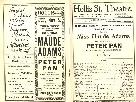 |
 |
 |
 |
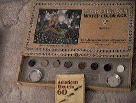 |
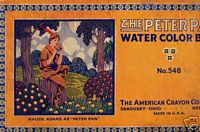 |
 |
 |
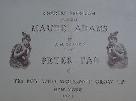 |
 |
 |
 |
 |
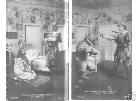 |
 |
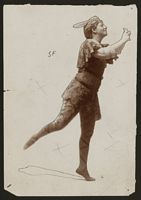 |
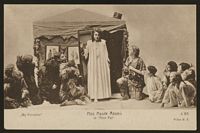 |
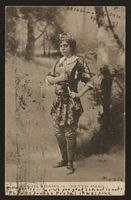 |
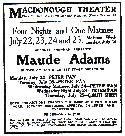 Oakland Tribune, June 25, 1907 |
 Elyria Evening Telegram, Oct. 10, 1913 |
 The Washington Post, Oct. 1, 1905 |
 Fort Wayne Journal-Gazette, Dec. 17, 1905 |
 Newark Advocate, May 1, 1907 |
 Oakland Tribune, June 25, 1907 |
 Trenton Evening Times, Dec. 5, 1907 |
 The Indianapolis Star, Nov. 3, 1912 |
 The Atlanta Constitution, Nov. 20, 1912 |
 Fort Wayne News, Jan. 22, 1913 |
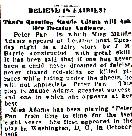 The Daily Review, March 14, 1913 |
 Reno Evening Gazette, April 15, 1913 |
The third article is interesting in that it points out she is returning from a rest and has gained thirty pounds. In row 2, the second article from the left is also particularly interesting. Apparently San Francisco newspapers were running articles saying Maude Adams would not perform Peter Pan in Oakland as there was a law about not allowing young children to perform on the stage. A probation officer pointed out that the law didn't apply to quality plays. One theater in particular is mentioned as being behind the "lies", and it's a really interesting story of competition among theaters of the time.
 Reno Evening Gazette, April 16, 1913 |
 Syracuse Herald, Jan. 14, 1923 |
 The Oakland Tribune, Nov. 23, 1914 |
The middle article is about a strange happening that indirectly involves Maude Adams. The final article is really funny, dealing with comparing Maude Adams in tights to another actress in tights.
The book of the original story and other things can be found here.
|























